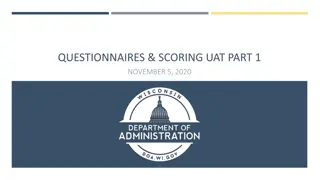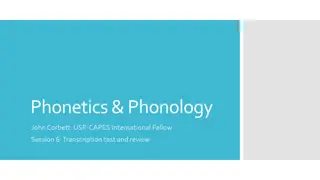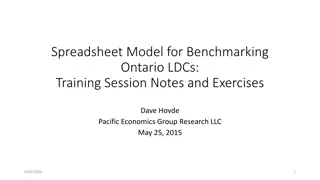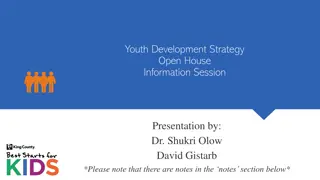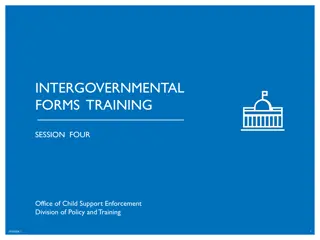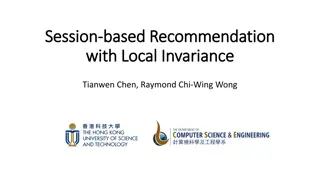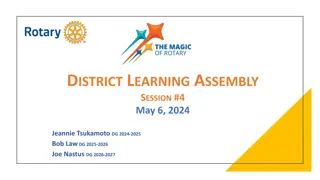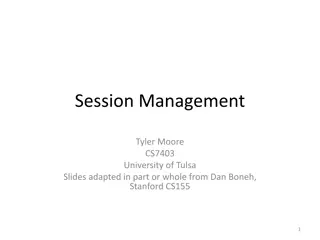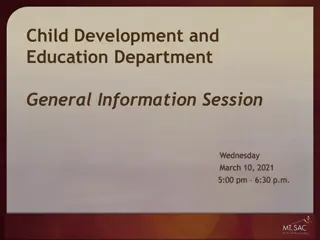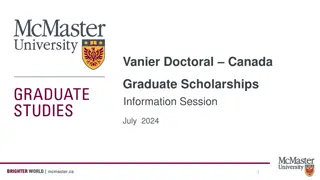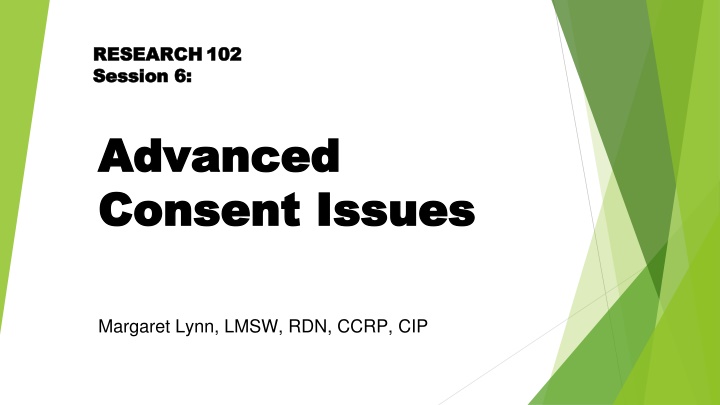
Advanced Consent Issues in Research: Regulations, Guidelines, and Essential Elements
Explore advanced consent issues in research, including regulations, guidelines, and essential elements of informed consent. Learn about topics such as assent, varying consent forms, regulatory frameworks, and key elements required for an informed consent form.
Download Presentation

Please find below an Image/Link to download the presentation.
The content on the website is provided AS IS for your information and personal use only. It may not be sold, licensed, or shared on other websites without obtaining consent from the author. If you encounter any issues during the download, it is possible that the publisher has removed the file from their server.
You are allowed to download the files provided on this website for personal or commercial use, subject to the condition that they are used lawfully. All files are the property of their respective owners.
The content on the website is provided AS IS for your information and personal use only. It may not be sold, licensed, or shared on other websites without obtaining consent from the author.
E N D
Presentation Transcript
RESEARCH RESEARCH 102 Session 6: Session 6: 102 Advanced Advanced Consent Issues Consent Issues Margaret Lynn, LMSW, RDN, CCRP, CIP
Advanced Advanced Consent Consent Issues Issues Objectives: To review essential and non-essential elements of informed consent.
Advanced Advanced Consent Consent Issues Issues Objectives: To discuss issues that are beyond the usual boundaries of the informed consent process: o Assent o Obtaining permission from the parent / legal guardian o Obtaining consent from the legally authorized representative for those who have diminished cognitive abilities o Non-English-speaking subjects o Alteration of consent o Waiver of consent o Remote, telephone, or electronic signatures
Regulations/Guidance Regulations/Guidance for Informed Consent Informed Consent for 1991, The Common Rule, 45 CFR 46, was adopted by many of the governmental agencies. The common rule is the baseline standard of ethics. The revised common rule was implemented on January 21, 2019. 199I International Conference for Harmonisation Good Clinical Practice [GCP E6 (R2)]. Freely given informed consent should be obtained from every subject prior to clinical trial participation.
Regulations/Guidance Regulations/Guidance for Informed Consent Informed Consent for Other sources: FDA Guidance Documents IRB Standard Operating Procedures Protocol Department/Institution policies State or local laws Follow the most restrictive policies regarding the informed consent process.
Regulations/Guidance Regulations/Guidance for Informed Consent Informed Consent for FDA 21 CFR 50 vs OHRP 45 CFR 46 The Elements of informed consent are virtually identical except: FDA requires the confidentiality statement to note "the possibility that the FDA may inspect the records. FDA requires a statement regarding study registry in Clinicaltrials.gov.
The The Essential Essential Elements Informed Informed Consent Consent Form Elements of Form of the the Research Purpose/Procedures Alternatives to participation Voluntary participation Identify which procedures are research and which are considered standard of care Confidentiality Compensation for injury Length of participation Risk/benefits/discomforts Contact Information
Additional Additional Elements Consent Consent Form Form that Elements of that may of the the Informed Informed may be be included included Additional costs to the subject Risks if the subject is or may become pregnant Circumstances under which the subject s participation may be terminated by the PI New findings that may affect willingness to participate Approximate number of subjects Consequences of a subject s decision to withdraw
Informed Informed Consent Consent Process Process It begins with recruitment materials such as flyers, ads, emails. 1. It continues with the first conversation regarding the study with the potential subject. 2. Allow ample time for discussion and exchange of information and time for the potential subject to discuss participation with family / friends. 3. Always allow time for questions. 4. Document the consent process in the research record. 5.
Research Research 101 101 information information https://www.uthsc.edu/research/clinical-research- development/previous-sessions.php
So So what what happens usual usual consent consent process occur, occur, is is impossible, unreasonable? unreasonable? happens if if the process can t impossible, or the can t or
Examples: Examples: A non-custodial parent brings a child to the research study visit. A potential study participant for a non-therapeutic observational study has intellectual disabilities
Examples: Examples: A non-English-speaking patient meets the criteria for a study where subjects are difficult to enroll but the study is not approved for subjects who do not speak English A subject agrees to participate in a study, but you find out later that the subject cannot read or write.
Examples: Examples: You have a subject population of visually impaired subjects You have a subject population that may include deaf or hard of hearing subjects
Examples: Examples: The principal investigator wants to conduct a telephone survey only. The subject will never be seen face-to-face. The study is a retrospective review of the blood chemistries of patients with abdominal surgery A child is a candidate for a study. One parent lives in another state. The study requires signatures of both parents.
Assent Assent Definition: Definition: Express typically typically officially. officially. Antonyms: Dissent from; refuse Express approval approval or or agreement, agreement, Two populations where assent would be obtained: o Children who have not reached legal age o Adults with diminished cognitive abilities.
Children Children who legal legal age age who have have not not reached reached Assent means a child s affirmative agreement to participate in research. Mere failure to object, absent affirmative agreement, should not be construed as assent. Permission means the agreement of parent(s) or legal guardian(s) to the participation of their child or ward of the state in research. Parent means a child s biological or adoptive parent.
Children Children who legal legal age age (continued) (continued) who have have not not reached reached Legal Guardian means an individual who is authorized by a court under applicable state or local law to consent on behalf of a child to general medical care. The term legalguardian as used here does not include: Grandparents non-custodial parents adult siblings step-parents other adult family members unless such individuals are authorized by a court of law to make decisions about general medical care for the child.
Children Children who legal legal age age who have have not not reached reached Case Study: John is a seven-year-old male who is participating in a three- year study of the efficacy of cannabidiol use in preventing seizures. After year one, the study sponsor decides to extend the study to four years. At the year-one clinic visit, consent / assent should be obtained from all subjects using a new consent form which explains the updated length of the study. John s biological father signed the original consent form but his stepmother has accompanied him to the one-year clinic visit. Can she give permission for John to participate in the study with the revised study length?
Children Children who legal legal age age who have have not not reached reached Solutions: Solutions: 1. Ask for proof of legal guardianship from the stepmother. If she cannot provide it at the clinic visit, ask that the father accompany John to the next clinic visit where the consent form can be signed. (This depends on the sponsors guidelines for when the new consent must be obtained). 2. If travel is an issue for the father, the study staff could email or fax a copy of the new consent form to him at the time of the year-one clinic visit; have a consent discussion over the phone; ask him to email or fax a signed copy of the new consent form. (This can only be done if you your IRB will allow this or it has been already approved).
Adults Adults without without or decision decision- -making capabilities making capabilities or limited limited Defining Defining cognitive cognitive impairment: A temporary or permanent loss of mental functions, causing forgetfulness, lack of concentration, learning difficulties, and other reductions in effective thinking. impairment: Cognitive impairment may be associated with partial or full inability to consent or assent to participation in research.
Adults Adults without without or decision decision- -making capabilities making capabilities or limited limited Examples: Examples: Persons with a diagnosis such as dementia or delirium Persons who are at high risk for being cognitively impaired, such as, intensive care unit patients, brain injured patients, or the very elderly Those with severe eating disorders Persons with addictions Those under severe stress or mental trauma
Adults Adults without without or decision decision- -making capabilities making capabilities or limited limited Tennessee does not have laws that govern research consent for cognitively impaired adults; however Legally Authorized Representative is defined.
Adults Adults without without or decision decision- -making capabilities making capabilities or limited limited In Tennessee, the identification of a LAR should normally be made using the following order of descending preference: conservator; guardian; attorney-in-fact; subject's spouse, unless legally separated; the subject's adult child; the subject's parent; the subject's adult sibling or any other adult relative of the subject; or any other adult who is familiar with the patient's personal values, who is reasonably available, and who is willing to serve.
Adults Adults without without or decision decision- -making capabilities making capabilities Case Study or limited limited Debbie is a 61year-old female with diagnoses of Down s Syndrome, Asthma, Arthritis, Hypothyroidism, Obesity, Gout and Congestive Heart Failure. She is outgoing and friendly. Her room is decorated with furniture and photos that she selected. She likes to keep her room CLEAN! She can bathe, dress and groom herself independently with prompts. She needs help with making decisions and her brother is her legal representative. She often says Yes to things asked of her but she has a hearing deficit so this may be the auto response because of the inability to hear everything that is said. She loves WWE.
Adults Adults without without or decision decision- -making capabilities making capabilities or limited limited Case study Debbie s heart failure has progressed. She wants to stay in her room most of the day and has very little energy. She has pitting edema in her lower extremities. She receives excellent care from her PCP and is receiving the standard of care for heart failure. She would be a candidate for an observational study that will measure longevity and morbidity of persons with Down s Syndrome. The study involves some clinic tests where mental capacity, physical strength, and pulmonary tests are done. When approached regarding participation, Debbie says Yes but clinic visits may last up to 2 hours each and it will mean missing some of her favorite TV shows.
Case Case Study Study Solutions Solutions In this case it could be assessed that Debbie will say Yes to please, when, in fact she may really mean No if she knows what the study will involve. Her legally authorized representative will need to talk with Debbie to make sure she understands the sacrifices she will have to make if she participates. Study staff will need to make sure that at each study visit she assents (verbally) to participation and that assent or refusal (dissent) is documented in the research record. Study staff can offer study visit times that do not conflict with the activities that she enjoys.
Adults Adults without without or decision decision- -making capabilities making capabilities or limited limited Adults who have the capacity to consent during study enrollment, but who may lose the capacity to consent at some point during study participation (due to Alzheimer s disease for instance) can name a future LAR upon study enrollment. This should be done in writing, such as on a healthcare proxy form, and be kept with the subject s research record.
Adults Adults without without or decision decision- -making capabilities making capabilities or limited limited At the time when the investigator determines the subject has lost the capacity to continue to consent to study participation, the designated LAR should be consented. Assent of the adult subject should be obtained if possible. The sustained objection in word or action of the subject to continued participation should be grounds for withdrawing the subject from the study, unless the study offers a unique opportunity for direct benefit not otherwise available outside the research setting
Adults Adults without without or decision decision- -making capabilities making capabilities or limited limited Document on the adult assent discussion page of the consent form. Document if the adult subject cannot sign the assent line on the assent discussion page. If the lack of capacity to give informed consent is temporary obtain consent when possible.
Non Non- -English English- -Speaking Subject Subject Speaking 45 CFR 46.116 and 21 CFR 50.20: The information that is given to the subject or the representative shall be in language understandable to the subject or the representative. At UTHSC, the requirement is to have IRB approval for non- English speaking subjects before enrollment along with a fully translated consent form in the native language of the subject. A Declaration of Translation is required.
Non Non- -English English- -Speaking Subjects Subjects (cont.) (cont.) Speaking At UTHSC, the person obtaining informed consent must be fluent in both English and the language of the subject or legally authorized representative, or be assisted by an interpreter. Family or friends of the prospective subject or legally authorized representative may not serve as interpreters. It is not acceptable for a verbal translation of an English informed consent document to be substituted for a written translation.
Non Non- -English English- -Speaking (cont.) (cont.) Speaking Subjects Subjects Other institutions may allow a Short Form Consent form where the document attests that the elements of informed consent have been presented orally to the subject or legally authorized representative. Check with your institution whether this is allowed.
Translators Declaration IRB# Principal Investigator Study Title To the UTHSC Institutional Review Board: I, , declare that I am fluent in and understand the English language and the and belief, the attached translation(s) are true, accurate and correct. language. To the best of my knowledge Attached (1) the original document (In English) and (2) the Translated versions(s). Translator s Name (Print): Address: Phone No. Fax. No. E-mail Signature Date
Non Non- -English English- -speaking speaking subjects subjects Case study: Jane is an experienced research study coordinator and is managing a study of a rare disease. Her site is approved for 5 subjects; Only 2 subjects have been enrolled over the past 4 years and enrollment ends in 3 months. A non-English-speaking patient meets the criteria for the study, but the study is not IRB approved for subjects who do not speak English.
Solutions: Solutions: If Jane s IRB doesn t allow a short form at her institution, she can ask the subject to return to the clinic after her IRB has approved Non-English-speaking subjects in her study. She will quickly need to find an interpreter or interpreting service to translate her consent form and to conduct the informed consent process and translate at other study visits. If Jane s IRB does allow short consent form, she may enroll the subject at the day of the clinic visit. If Jane s IRB does not allow a short consent form, she can be pro-active and begin a dialogue about changing the procedure at her institution.
Illiterate Illiterate Subjects Subjects Check with the policies of your institution. Generally, subjects may place an X or their mark rather than a signature. After study information has been discussed, the potential subject should be able to describe: a. the study procedures in lay terms b. c. the risk(s) and benefit(s) of being in the study indicate approval or disapproval regarding participation in the study
I Illiterate lliterate Subjects (cont.) (cont.) Subjects Fully document the details of the informed consent process. A copy of the informed consent document with the subject s mark and signature of the person obtaining consent should be given to the subject or his or her legally authorized representative. Check with your institution whether video and audiotaping of the process may / should be used as documentation of the process (with permission of the individual)
Visually Visually Impaired Impaired Subjects Subjects Check with the policies of your institution. Generally, subjects may be enrolled in a research study by making or placing an X or their mark . If the subject is unable to make an X on the signature line, he/she can verbally consent and can designate a representative (for example, a relative, hospital patient advocate, social worker, etc.) to sign the consent line for him/her, provided the latter party is not involved in the actual conduct of the study.
Visually Visually Impaired Impaired Subjects (cont.) (cont.) Subjects After study information has been discussed, the potential subject should be able to describe: a. the study procedures in lay terms b. the risk(s) and benefit(s) of being in the study c. indicate approval or disapproval regarding participation in the study
Visually Visually Impaired Impaired Subjects (cont.) (cont.) Subjects Fully document the details of the informed consent process. A copy of the informed consent document with the subject s mark and signature of the person obtaining consent should be given to the subject or his or her legally authorized representative. Check with your institution whether video and audiotaping of the process may / should be used as documentation of the process (with permission of the individual)
Visually Visually Impaired Impaired Subjects Subjects Use a large, easy to read font for consent forms or any other printed material that subjects are asked to read.
Subjects Subjects who or or hard hard of who are of hearing hearing are deaf deaf The use of a sign language interpreter needed. After the consent form has been reviewed, the prospective subject should be able to explain all major elements of consent information that were disclosed in the interview.
Subjects Subjects who or or hard hard of who are of hearing hearing are deaf deaf Fully document the details of the informed consent process. A copy of the informed consent document with the subject s mark and signature of the person obtaining consent should be given to the subject or his or her legally authorized representative. Check with your institution whether video and audiotaping of the process may / should be used as documentation of the process (with permission of the individual)
Waiver Waiver or or Alteration Alteration of of Consent Consent You may ask for a waiver of alteration of consent and the IRB may approve it if the following conditions are met under 45 CFR 46.116(f): The research involves no more than minimal risk to the subjects; The waiver or alteration will not adversely affect the rights and welfare of the subjects; The research could not practicably be carried out without the waiver or alteration
Waiver or Alteration of Consent You may ask for a waiver of alteration of consent and the IRB may approve it if the following conditions are met under 45 CFR 46.116(f) (cont.): If the research involves using identifiable private information or identifiable biospecimens, the research could not practicably be carried out without using such information or biospecimens in an identifiable format Whenever appropriate, the subjects will be provided with additional pertinent information after participation.
Waiver Waiver of of consent consent Example Study to determine whether some specific blood chemistry values change in people undergoing clinically indicated abdominal surgery, and if there is a correlation of changes with increased incidence of complications after surgery. Involves review of medical records of all patients who have undergone abdominal surgery in the past two years (about 10,000 surgeries), collecting limited data that will be double- coded so link is known only to researchers. Results of the research will not affect clinical care of the individuals, since they will already have left the hospital.
Waiver Waiver of of consent consent Regulatory rationale for approval of the waiver: Minimal risk: Fits definition. Would not adversely affect rights and welfare of subject: Surgery and associated blood chemistry values are clinically indicated, therefore would be done regardless of the research. No study results would affect clinical decisions about the individual's care.
Waiver Waiver of of consent consent Regulatory rationale for approval of the waiver: Research could not be practicably carried out without the waiver: Identifying and contacting thousands of potential subjects may not be practical and some subjects may be deceased. Whenever appropriate, subjects are provided with additional pertinent information after participation: Not appropriate in this case, since results of research would have no effect on the subjects.
Waiver Waiver of of consent consent (Example adapted from Institutional Review Board: Management and Function, R. Amdur and E. Bankert, Chap. 6-6, "Research without Consent or Documentation Thereof," M. M. Elliott.) and https://irb.ucsf.edu/waiving-informed- consent#:~:text=Service%20Program%20Studies- ,Waiver%20of%20All%20Consent,care%20and%20oth er%20limited%20circumstances.


